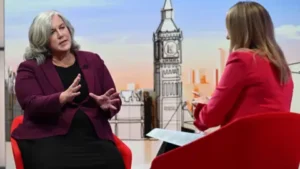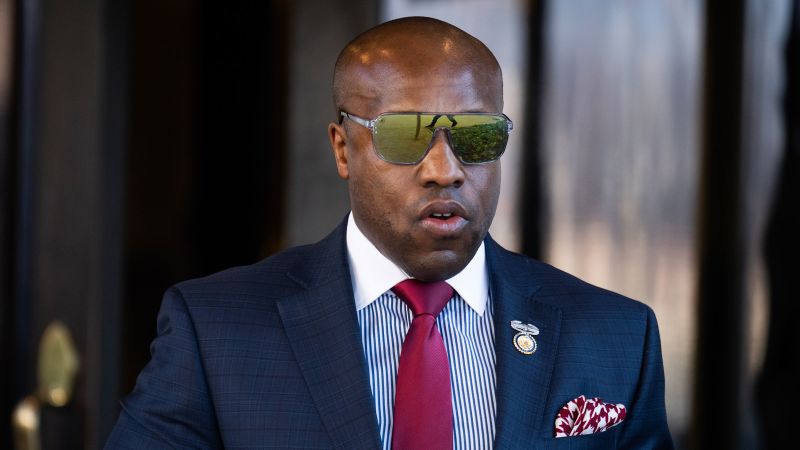The political landscape in Texas is witnessing a turbulent Senate race, particularly driven by the actions of Republican Representative Wesley Hunt, who has made a bold decision to remain in the contest against incumbent Senator John Cornyn and Texas Attorney General Ken Paxton. GOP leaders in Washington are reportedly pushing Hunt to withdraw from the race, expressing fears that his candidacy could siphon crucial funds away from the Republican campaign, which could cost tens of millions of dollars and disrupt the party’s strategy for the midterms. However, Hunt, displaying a steadfast determination, affirmed in an interview with CNN that he is committed to staying in the fray.
Hunt, a 44-year-old combat veteran with two terms in the House under his belt, shared his intentions to officially file for the Senate race, quelling weeks of speculation regarding his political future. Observably confident, he dismissed warnings from the GOP establishment, suggesting that the internal party politics would not dictate his decisions. Hunt even entertained the idea of a “David and Goliath” battle against the long-serving Cornyn, emphasizing that he believes the political base in Texas is searching for a robust alternative, which he pledges to provide.
In alignment with MAGA ideals, Hunt is actively seeking the endorsement of former President Donald Trump. There has been considerable discussion among top Republicans, including Senate Majority Leader John Thune, to persuade Trump to clear the pathway for Cornyn by endorsing him. Nonetheless, insiders seem to indicate that Trump may delay his decision until a leading candidate becomes apparent in the primary scheduled for March 3. This postponement poses a strategic risk; should no single candidate secure a majority, they would likely have to engage in a costly runoff election on May 26, which could further drain financial resources.
The prospect of prolonged campaigning raises concerns within GOP circles of a severe attrition of funds and energy, as candidates might emerge from a grueling primary or runoff battered and less competitive against potential Democratic challengers. The stakes are particularly high, given that the landscape in Texas has not favored Democrats in a statewide race since 1994, but the potential vulnerability of a scandal-ridden candidate like Paxton has Democrats buzzing about a possible upset.
Cornyn has openly cautioned that the prolonged conflict in their own party could lead to significant financial losses that could jeopardize key races in other states where Republicans need to consolidate support to maintain their majority. Highlighting the consequences of Hunt’s continued candidacy, he insinuated that it could end Hunt’s political aspirations altogether, a claim that Hunt dismissively rebuffed by referencing his experiences in combat, asserting that he has faced far greater challenges.
Politically charged exchanges have characterized the relations among Hunt, Cornyn, and Paxton. Paxton has managed to keep a lower profile, while Hunt and Cornyn have primarily unleashed barbs at each other, contrasting their qualifications and political records. Furthermore, Hunt has strategically opted to avoid playing the personal game, choosing instead to focus on policy differences, despite the unflattering narratives that have surfaced surrounding Paxton.
Notably, Cornyn’s tendency to flip-flop on critical issues, including his handling of Trump-related controversies, has made him a target of criticism from both Hunt and Paxton. As the race unfolds, financial aspects have become a key factor, with Cornyn’s allies expressing anger over Hunt’s refusal to withdraw, stating that money currently spent on Cornyn could otherwise reinforce their broader strategies in battleground states during a politically precarious midterm environment.
In the backdrop of this intense competition, Hunt has made it clear that he has not received any discouragement from Trump’s circle. While Hunt maintains a steady connection with the political institutions, Cornyn is scrambling to solidify his ties with Trump for a timely endorsement that could fortify his position.
The pursuit of Trump’s endorsement becomes intricately tied to campaign dynamics, as it could potentially end the race for Cornyn, while leaving Hunt in a promising position for his insurgent challenge. The political brinkmanship, campaign financing prospects, and the intricate dance for endorsements underscore the drama and unpredictability enmeshed within the Texas Senate race as it heads towards critical decision points. As tensions rise and stakes elevate, it remains uncertain who will emerge victorious in this competitive arena. The political battle lines are drawn, and both camps are bracing for what might become an unyielding contest as they head toward the primaries.











